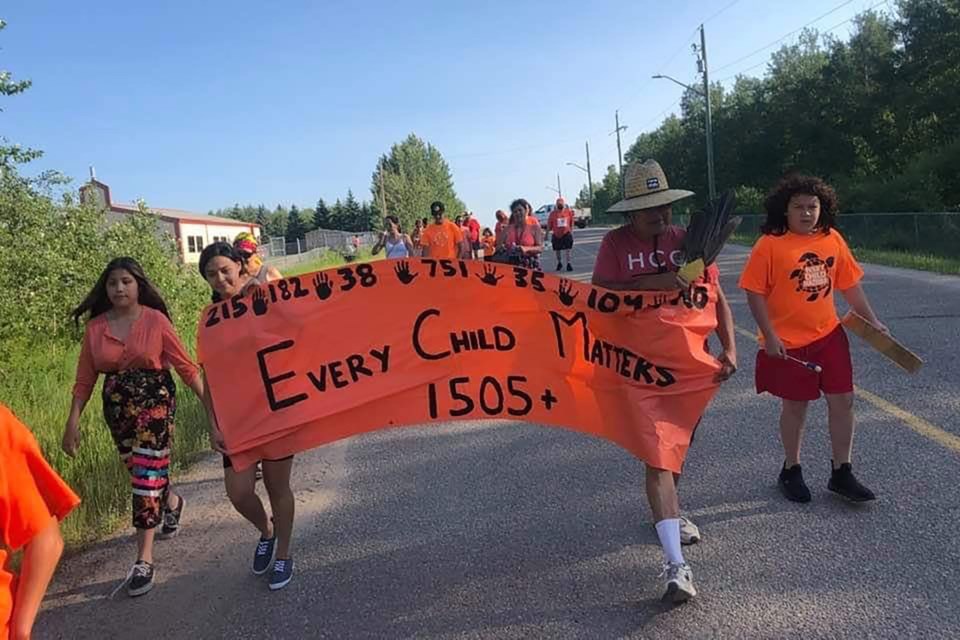KIKINO - To honour the children left in unmarked graves outside the perimeter of former residential schools, Kikino Mothers organized a walk of remembrance.
Adorned in orange shirts and ribbon skirts, the group that also included children and husbands, set off from Kikino school and travelled close to a kilometer to the Kikino graveyard to pray and remember the children who never returned home after attending Indian Residential Schools.
Phyllis Erasmus, is among the first generation of children born to residential school survivors. She organized the event with her niece Billy Breton. Erasmus said the majority of the individuals that attended the event and small ceremony on July 1 had family members who were forced to attend either Edmonton Poundmaker residential school or Blue Quills Residential School.
“What if they didn't come back? We wouldn't be here,” said Erasmus, speaking of her own parents.
During the walk, Erasmus and other participants struggled to make sense of the complicated emotions they were experiencing. She says it took an emotional toll to pay tribute to those who were lost, and yet being thankful for their loved ones who made it through the system and returned home.
While the group made their way toward the graveyard, they played an emotionally charged track by Fawn Wood, a popular Cree and Salish artist called Remember Me.
“It was kind of sad and joyful at the same time. It’s hard to explain because those kids didn’t come home, but we are happy that our parents came home.”
Ripple effects
Through her own experiences, Erasmus has felt the ripple effects of the former residential school in her own family and upbringing. Even though growing up her parents “absolutely refused to talk about it,” the impact of the institution was still present her childhood, she says.
“We weren't taught our language because they didn't want us to go through what they went through - getting hit because they spoke Cree. So, they never taught us. They never taught us anything about our culture,” she said. “It was hard because you don't you don't fit in anywhere. You don't fit in with your older relatives because they all talk Cree. They know our culture. You don't fit in with, obviously, the white people because of your skin colour. There was no winning.”
The residential school system, she says, has left lasting marks on her and other Indigenous community members, but she feels like there is a need to try and heal from the traumas inflicted on First Nations peoples.
“We have to get past the hate,” she said, adding the walk did help relieve some of the pain and anger held onto by participants. “We had a lot of us that had tears in our eyes.”
Kisâkihitin
When the group arrived at the graveyard, people shared stories of the parents and grandparents, of their childhood and their memories. Erasmus said a sad similarity came to light during recollections of the past.
“We had one thing in common: our parents never ever said, ‘I love you.’ We knew that they loved us. But they never ever said it. I thought it was just my parents, but I guess it was everyone's parents (who attended residential school),” she said.
“We never heard I love you and I figured I want my kids to know I love them.”
With the intent of breaking cycles formed in the past, Erasmus wants to change the narrative for her children and stepchildren. “We always say goodnight, I love you, and sound like the Waltons,” she laughs. She adds that her children also speak the phase in Cree, telling her, “Kisâkihitin,” meaning I love you.
But for Erasmus, who only began reconnecting and learning about her Cree culture in her thirties, this is a very serious matter. She says that although she doesn’t speak Cree herself, she is proud that her children do. While attending Kikino school, Erasmus’s children were taught the languages of their Elders. Ancestorial languages skipped generations in many families due to efforts to assimilate First Nations people by the Canadian government, Erasmus says.
Other cultural activities revived by Kikino school include jigging and playing the fiddle. “It is very uplifting to know that our culture is going to continue,” she said.
Erasmus says she has hope for the future, and hopes that more truth comes to light to help expose past atrocities, to begin the process of healing. Whether it’s through events to reaffirm “Every Child Matters” or through conversations, she says, “we must learn to forgive.”


